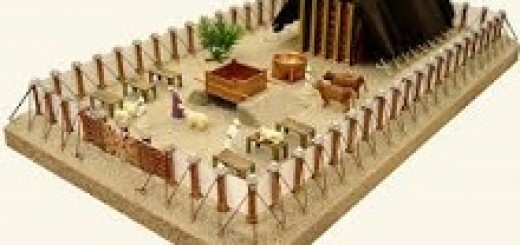Eating the Limb of a Living Animal
By Rabbi Amiram Markel
Originally, until the time of Noah, mankind was not meant to eat meat. Adam was commanded, “You may certainly eat of all the trees of the garden but as for the tree of the knowledge of good and evil, do not eat from it etc.” From this we surmise that, except for the tree of the knowledge of good and evil, Adam was permitted by G-d to eat only fruits and vegetables. Only later did G-d permit the consumption of meat when He told Noah, “Every creeping thing that is alive will be yours to eat similar to green vegetables etc.”
Nonetheless, as the Torah relates, the generations until the great flood were very evil in G-d’s eyes and, over time, descended into lower and lower levels of perverseness and depravity. Eventually, they fell so low that, in addition to other matters, not only did they eat meat, but they also ate the limbs of living animals, similar to wild beasts, which tear apart and devour their prey while it still lives. One can imagine the terrible savagery and cruelty of such acts.
As mentioned above, after the great flood, when Noah, his family and all the animals which survived with him, left the Ark, he and all his descendants were permitted by G-d to eat meat. However, the only caveat was the prohibition against eating the flesh of a living animal. The animal would first need to have died or be slaughtered and only then could it be consumed. Even part of the animal, such as a limb, could not be eaten while it still lived. This law, which is one of the seven laws received by Noah from G-d, is a universal law which applies to all mankind to this very day.
Today, as citizens of the western world, living in the 21st century, it is very difficult for us to imagine how anyone would want to eat a living animal. We cringe at the thought of committing such a cruel and gruesome act. It seems utterly barbaric and animalistic beyond description. However, it must be understood that we only have such sensitivity because, by now, during this juncture of history, most of the world has already been profoundly influenced by and imbued with the ethics and mores of Torah, either directly or indirectly.
Nonetheless, even today, in those parts of the world which have been relatively untouched by the influence of Torah, such practices are still prevalent and are every day occurrences. One example of this is Thailand, where it is considered to be a delicacy to scoop out and eat raw monkey brains while the victim is still alive and quite conscious. Furthermore, this is not just the practice of uncultured village primitives living in a remote corner of the Siamese jungles. Rather, this is a normal practice within the great metropolises of Thailand and is regarded as a delicacy of the rich and famous.
The Seven Noachide Laws
The seven Noahide laws are:
1) Do not commit Idolatry
2) Do not Blaspheme G-d
3) Do not murder
4) Do not steal
5) Do not commit forbidden sexual acts
6) Do not eat the limb of a living animal
7) Set up courts of law
Six of these laws were originally received from G-d by Adam, and the additional law concerning eating the limb of a living animal was given to Noah. Though G-d is the source of these seven laws, just as He is the source of the Torah, nonetheless, they serve a completely different function than the 613 mitzvoth (commandments) of the Torah. This is not merely a quantitative difference. It is not just that Jews have more commandments and therefore greater responsibility toward G-d than non-Jews. Rather, there is a profound difference between these two sets of laws. This is so much so, that they cannot be compared to each other altogether, in that they are of a different order and category.
The purpose of the seven commandments given to Noah is to civilize mankind, so that rather than being a “dog eat dog” world; a world of cruelty, bloodshed and violence, which degenerates into ever increasing chaos and turmoil, it becomes a world of lawfulness; a world of civilized, orderly society dictated by social mores, standards and customs. We, therefore, see that the function of these commandments is to make the world a settled, wholesome place.
Preventing Sadistic Tendencies
Now, in regard to the subject at hand, the commandment forbidding man from eating the limb of a living animal is to prevent him from sinking into sadistic tendencies of cruelty and bloodlust toward animals, which inevitably will spill over into his relationship with his fellow human beings as well. A person could rationalize to himself, “Of course, I would never be cruel to my fellow man. However, what is wrong with eating a live animal? First of all, it is for the purpose of eating, which I must do to survive, and secondly, it is quite normal in the animal world. I would not be doing unto them anything that they would not do unto me.”
The response to the first argument is that eating the animal alive is unwarranted cruelty. Animals, such as wolves or tigers, have no choice in how they hunt their prey. The only method available to them is to tear their prey apart with their teeth. Once they do this they become totally driven by the instinct of bloodlust and there is no stopping them. A human being, on the other hand, does not kill with his teeth. He could just as well kill the animal before he eats it, thus putting it out of its misery. Eating it alive would only be because he gets some kind of perverse pleasure and thrill in being cruel.
Such an act would only fuel his love of cruelty and fan the flames of his basest nature, and as we said above, inevitably this tendency to sadism would spill over into his relationship with his fellow human beings. As known, many sadistic serial murderers initially tortured and killed animals before graduating to torturing and murdering humans.
Now, as far as the answer to the second argument, i.e., that “animals do it”, he testifies against himself, because such an argument is itself proof that he equates himself with animals and has sunk to the level of a beast of prey.






















